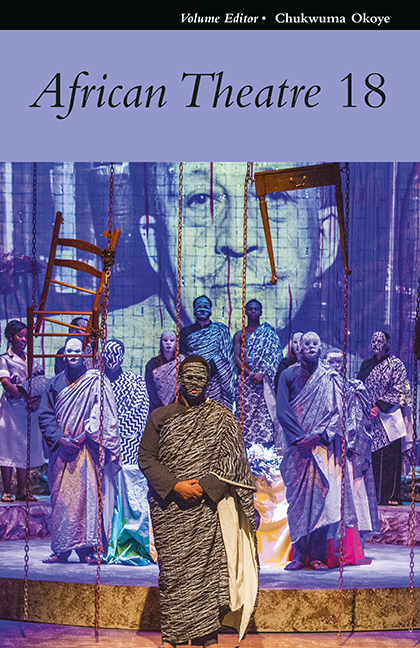An Initial Investigation into Contemporary Theatre Audiences in Malawi
Published online by Cambridge University Press: 02 April 2020
Summary
We were so late! We had been driving around rural Lilongwe for hours and now, embarrassingly, I was over an hour late for my own production! The panic, the embarrassment and the stress of trying to find the way, to keep up a professional persona and & we arrived. I was met with a wall of human backs, rippling and undulating in physical response to a something, a happening going on in front of them, but concealed from my view. I walked around to the side of the group and one of its members generously gave up some of their space for me. I went from outside to inside, from being late to being right there in the moment: I became part of it myself, part of the audience, the audience at Chingalire Village, Lilongwe, Malawi in April 2016, watching Romio ndi Julieti.
Context
Malawi has a long history of live performance, with public and collective rituals to mark occasions from the deeply personal to the nationally political. As Patience Gibbs writes, such performances mark ‘life cycle and seasonal changes or & historical and legendary events’ through traditional ceremonies and festivals (1980: 5; Kerr 1987: 115). Lisa Gilman explores the more contemporary significance of dance and songs in her 2004 book, The Dance of Politics: Gender, Performance, and Democratization in Malawi (2011). It is important to stress that contemporary Malawian culture is a fusion of traditional ethnic groups including, but not limited to the Chewa, Nyanja, Tumbuka and the Yao, which intersperse the retained cultural legacy, left over from British colonialism, and the more recent Chinese and American cultural influences. Furthermore, the history as to how the Malawi as we know it now came to be an independent republic is complex and has at times been violent and bloody, though it is currently a stable democracy (McCracken 2012). There is so much more to Malawi's cultural and political history but it is beyond the scope of this article to go into further detail here. However, Christopher Kamlongera, Patience Gibbs, James Gibbs, Mufunanji Magalasi, David Kerr and Zindaba Chisiza are scholars who have all written extensively about various aspects of Malawi's diverse performance heritage.
- Type
- Chapter
- Information
- African Theatre 18 , pp. 63 - 82Publisher: Boydell & BrewerPrint publication year: 2019

